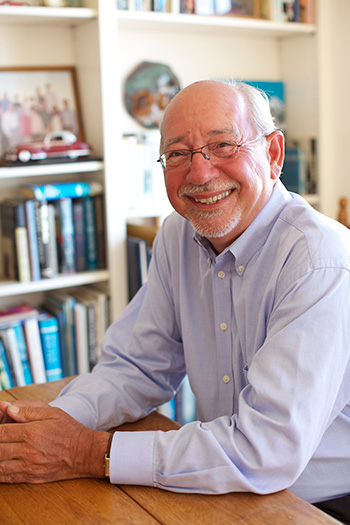
It seems propitious that John F. O. Bilson, the new John and Mae Calamos Dean Endowed Chair at Illinois Tech’s Stuart School of Business, would travel nearly 10,000 miles from Melbourne, (Victoria) Australia, to Chicago to begin what would be a lifetime career in finance—considering that it wasn’t his intention to do so. When Bilson was an economics graduate student at Monash University, a visiting professor from the University of Chicago suggested that he enter that institution’s Ph.D. program in international economics. Bilson took his advice and while listening to a lecture at Chicago by Eugene Fama—who would go on to share in the 2013 Nobel Memorial Prize in Economic Sciences—he experienced a shift in direction.
“Fama suggested that we students really learn about finance,” Bilson recalls, noting that both exchange rates and the stock market were undergoing a chaotic period at that time. “A little flashlight went off in my head that maybe it would be a good idea for me to write my dissertation on applying finance to exchange rates.”
That small beam turned into a spotlight as Bilson would go on to teach topics in exchange rates on the faculties of Chicago, Northwestern University, Stanford Graduate School of Business, and the Stanford University Hoover Institution. In 1987 he began working for the late John A. “Jack” Wing, chief executive officer of the investment banking and brokerage firm The Chicago Corporation and Illinois Tech trustee, who believed that after the Stock Market Crash of 1987 a new breed of finance student was in order. Wing recruited Bilson and other Chicago-area finance experts into an informal think-tank to design a graduate-level finance program built on a technical foundation.
Thus began Stuart’s Center for Financial Markets (now the Center for Financial Innovation) with Wing as its first director. From 1995–99 Bilson directed the center’s Financial Markets and Trading Program and since 2005 has directed its latest iteration, the M.S. in finance and the master’s in mathematical finance programs. Looking out the north-facing windows of his office on the 18th floor of IIT Tower, Bilson gestures toward Chicago’s Loop as he discusses collaborative plans underway at the business school.
“Chicago has been an innovative city for finance going all the way back to the 1880s, when we started creating the futures markets as a way of helping farmers decide what to produce, and know today what price they could get at the end of the season,” says Bilson. “So, basically, what we’re doing is trying to take that history of the city and converting it into an academic program.”
One way Bilson is doing so is by envisioning Stuart’s Downtown Campus as a hub of entrepreneurship and innovation that will offer students academic collaborative opportunities in design, business, and law.
“This will give us a unique character in a crowded business school market,” he says. “No other business school in the city has a design school. Design is taught in a collaborative framework and business is technical. This is the time in which we can create a new kind of business school that fits in with the technological nature of what is happening in the community.”
Joint finance program offerings on the Mies Campus are already in the process of expansion. In addition to the new mathematical finance degree program that Bilson heads, other degree programs being considered are algorithmic finance, electricity markets, and financial regulation compliance. Members of the Stuart community have been involved in entrepreneurial initiatives coordinated by World Business Chicago and are looking to do more in the city’s burgeoning fintech (financial technology) scene and Chicago’s Financial Services Pipeline Initiative, formed to encourage the hiring of women and minorities in financial services business. Stuart students are creatively enhancing both their résumés and the reputation of Stuart School by participation in finance showdowns such as the CFA Institute Research Challenge and the Chicago Quantitative Alliance Student Portfolio Contest. Bilson served as advisor to the quant team, which took first place in 2015 and 2016.
While finding even more ways to increase the school’s visibility can be challenging, Bilson believes that Stuart School has the distinct advantage when it comes to an issue affecting every business school.
“The world is developing so rapidly that it’s incredibly difficult for universities to keep up,” he says. “But at Stuart we’re a lot more flexible than some of the bigger schools, can change direction more easily because we’re smaller, and can more readily introduce new concepts and products.”